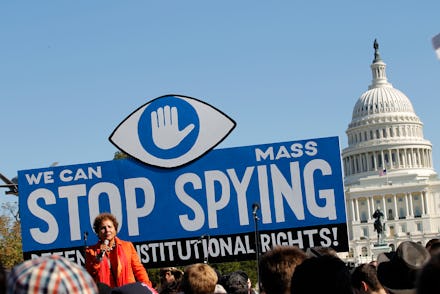This Simple Tool Tells You Where Your Representatives Stand on Government Spying

This week, an age-old legislative monster is rearing its head once again: CISA, the surveillance bill that just won't die.
CISA stands for the Cybersecurity Information Sharing Act. It allows corporations to seek immunity from virtually any prosecution as long as they cooperate with government surveillance by turning over massive amounts of consumer data. The American Civil Liberties Union calls it the "Patriot Act 2.0."
The National Security Agency and members of Congress have used high-profile breaches, like the hack of the Office of Personnel Management or the cyberattack on Sony Entertainment, to bring the bill back into consideration after it had been largely shamed out of existence by privacy activists.
"Congress takes notice when people get upset and their phones start melting."
In response, the activist group Fight for the Future — the same group that used an Internet blackout to protest and kill SOPA — has built a tool to tell you on which side of the issue your representative stands, and help you get in touch with him or her before the bill potentially comes up for a vote.
The site has a pull-down menu where you can choose your state, find your local representative and find a letter grade (A+ to F) on how each candidate has previously voted on Internet surveillance issues, dividing them into two camps: Team Internet and Team Surveillance.
For example, here's Ohio:
And New York:
Clicking on a representative's information brings up his or her voting record:
"We wanted to put these congressmen on the record about where they stand so they can't hide anymore, because people are hungry for information about how their representatives stand on these issues," FFTF campaign director Evan Greer told Mic. "Congress is beholden to a lot of interests that aren't their constituents. But they take notice when people get upset and their phones start melting."
Why activists are fighting back: CISA asks Americans to trade our personal security for the promise of safety. "CISA doesn't even address the root issue of our cybersecurity problems," Greer said. "Every expert agrees that information sharing wouldn't prevent the OPM hack or the Sony hack. And in the process of not fixing those problems, it opens massive loopholes that allows of sweeping surveillance of innocent people."